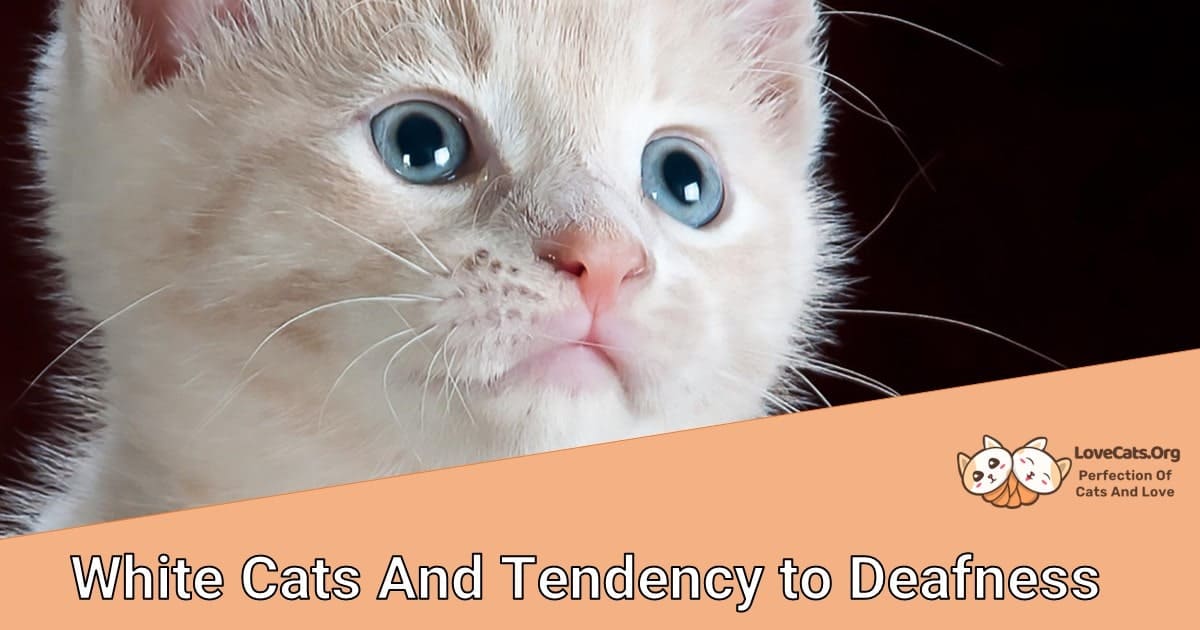White cats are prone to Deafness because white is the color of the eye pigment. The eye pigment is called melanin, and the color of the pigment is determined by the amount of melanin present. The lack of melanin makes the eye color white. Deafness is caused by the lack of melanin in the inner ear.
Are White Cats Prone To Be Deaf?
Yes, white cats are prone to be deaf. This is because they lack pigment in their inner ear. This causes them to hear sounds at lower frequencies than usual. However, this condition can be treated with medications specifically for that condition. If your cat has been diagnosed with white cat hearing loss, you should seek treatment right away.
Scientific Explanation for White Cats’ Tendency to Deafness
The color of your cat’s fur is determined by the pigment melanin. Black cats have a high concentration of melanin, which makes them darker. This makes them less likely to be sensitive to light. If your cat has white fur, it is probably due to a recessive gene mutation. Your cat inherited the gene from both parents, but only one parent passed on the trait. This is why white cats are more likely to be deaf.
White cats are more likely to be deaf than other breeds. The American Cat Fanciers Association (ACFA) reports that white cats have a 1.5% chance of being deaf.
Some white cat breeds are more likely to be deaf than others. The deafness gene is called DFNa, found in white cats. These cats are more likely to be deaf than other white cats. Knowing if your cat is deaf before purchasing them is essential. A cat with this gene has a 50% chance of being deaf.
Blue-eyed White Cats Have a Higher Chance Of Being Deaf
Blue eyed white cat is more likely to be deaf than a blue-eyed white cat. This is due to the recessive genes of the blue eye gene, which may be carried by both parents or one parent. If both parents are carriers of this gene, there is a 25% chance of the offspring being deaf. If one parent carries the gene, the chance is 50%.
According to Cornell Feline Health Center, Researchers found that only 17 to 22 percent of white cats with non-blue eyes are born deaf. The percentage rises to 40 percent if the cat has one blue eye while going even higher for 65 to 85 percent of all-white cats with both eyes blue are deaf. Some of these cats are deaf in only one ear.
Age-Related Hearing Loss In Cats
Some white cats are more likely to be deaf than others. The leading causes of hearing loss in cats are hereditary and age-related. The most common hereditary cause of Deafness is progressive sensorineural hearing loss. Hearing loss occurs in cats over 10 years old and is caused by the degeneration of the sensory cells in the inner ear. Age-related hearing loss is most common in cats over 8 years old. This is usually due to wax accumulation in the ear canal or the outer ear. Cats with a genetic predisposition to ear problems may be more likely to have hearing problems. If you notice your cat has a problem with his hearing, consult your veterinarian immediately.
Types of Deafness In Cats
The most common cause of hearing loss in cats is genetic. Deafness is not hereditary and may occur in a cat of any breed. White cats have a recessive gene that causes Deafness. Deafness is caused by a mutation of the cat’s auditory canal, the part of the ear where sound vibrations are transmitted to the inner ear.
There are several types of Deafness in cats.
- Aural Deafness (called Conductive Hearing Loss) occurs when the cat’s auditory canal is blocked or narrowed.
- Conductive hearing loss is often caused by infection, inflammation, or trauma to the ear. Conductive hearing loss may also occur when the cat’s ear drum is ruptured or torn.
- Incomplete or Persistent Otitis Media (also called Middle Ear Deafness) is when the middle ear is infected.
- Middle Ear Deafness may be caused by a foreign object stuck in the cat’s ear, or it may be due to an allergy.
- Otitis Media is a condition where the middle ear is inflamed. Otitis Media is usually caused by an infection.
- Mastoiditis is an inflammation of the mastoid bone behind the ear. Mastoiditis is often caused by an infection. Infection of the tympanic membrane is also called otitis externa or otitis media.
Conclusion
In conclusion, white cats are definitely prone to being deaf. However, there are ways to properly care for white cats so they are not prone to this ailment. If you have any questions or concerns, be sure to speak with your veterinarian.


